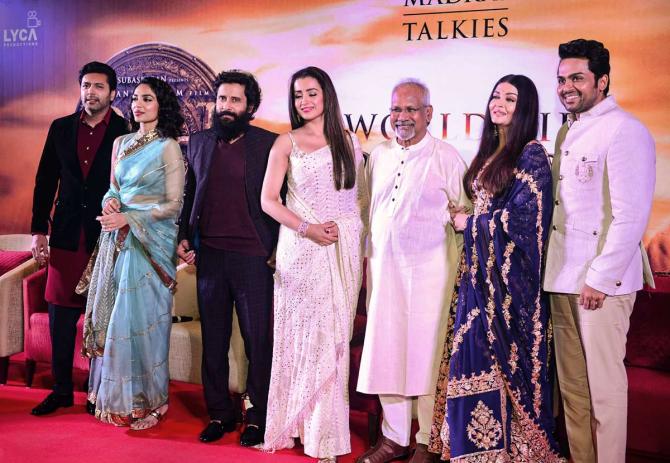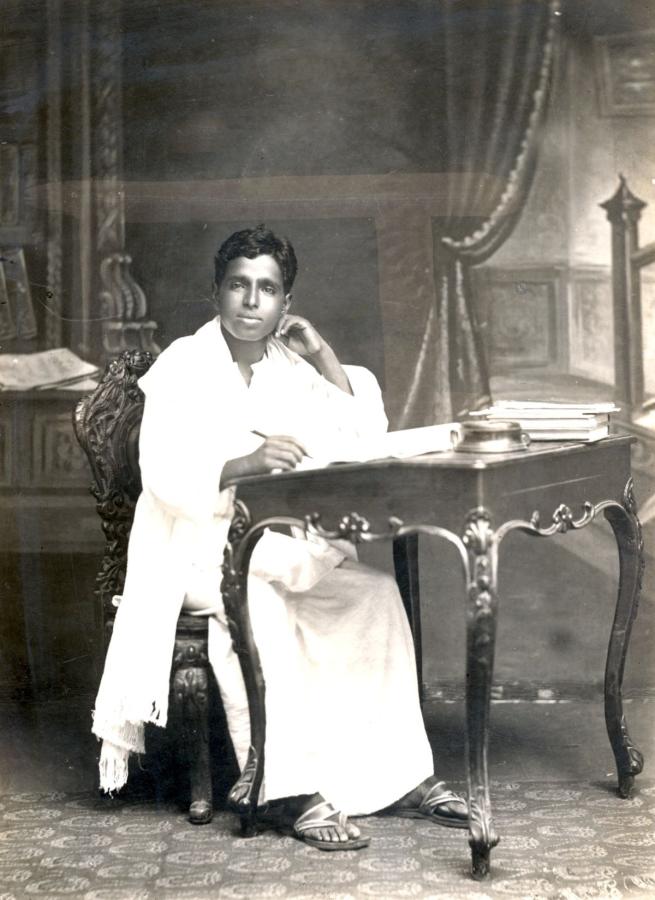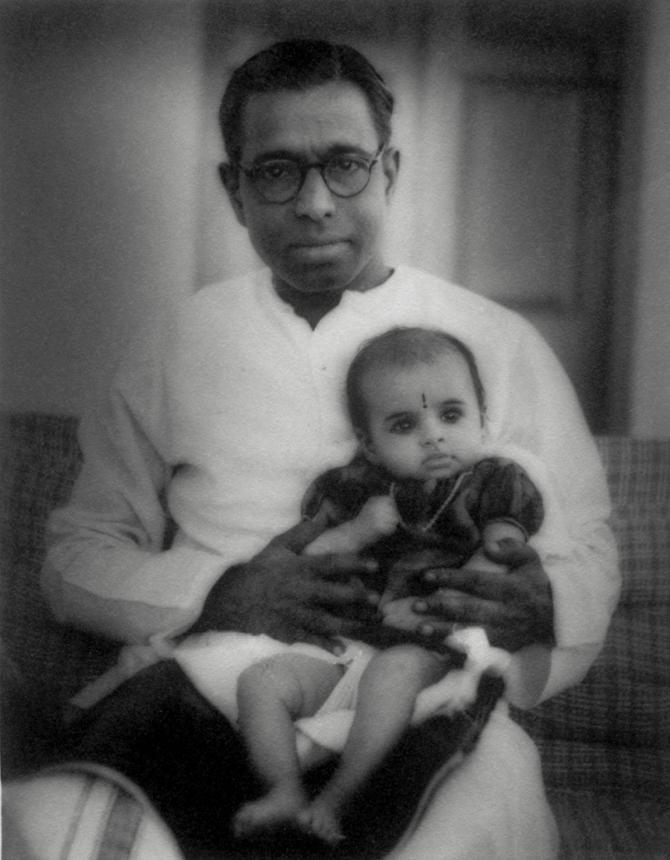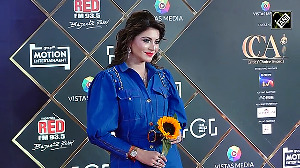Gowri Ramnarayan explores the world of Kalki Krishnamurthy whose magnificent novel Ponniyin Selvan has inspired Mani Ratnam's latest film PS I.

Based on the cult Tamil novel Ponniyin Selvan, film-maker Mani Ratnam's PS I has triggered a new interest in its author, Kalki Krishnamurthy (1899-1954).
True, Kalki enjoyed celebrity status in his lifetime, and continues to have fan associations whose sole business is to discuss his writings.
Many of them visit the sculpture garden in Mahabalipuram, determined to see the exact spot where Sivakami danced.
If you say, 'But she is a fictional character in Kalki's novel Sivakamiyin Sapatham!, they will tell you, 'She is real enough for us.'
Others undertake tours to places mentioned in Ponniyin Selvan. These 'pilgrims' will declare that a dilapidated temple in a forgotten nook in Thanjavur town was built a thousand years ago by the Chola emperor Rajaraja I (947 CE-1014 CE), to memorialise his stepmother Mandakini, who is nothing but a figment of Kalki's imagination.
All these admirers are Tamil born. But now, many who struggle to pronounce 'Kalki' and 'Ponniyin Selvan' want to know more about this iconic Tamil writer.

Born in a poor family in a Thanjavur village, young Krishnamurthy quit school to answer the Mahatma's call for non-cooperation with the British Raj. In no time at all, he found himself in Navasakti, edited by Ondependence activist and trade unionist T V Kalyanasundara Mudaliar, writing a serialised translation of the Mahatma's My Experiments with Truth.
Next came a stint with Vimochanam, C Rajagopalachari's anti liquor magazine. All his life, Kalki was to remain Rajaji's faithful lieutenant and campaigner, even when the leader was attacked by members of his own party.
Kalki's allegiance to his lifelong mentor invited antagonism, and even led to his creative achievements being denigrated.
Kalki became a celebrated writer/editor when he joined Ananda Vikatan. He added to the magazine's stature and sales. His writings began to launch debates.
As with the novel Tyagabhumi, the land of sacrifice, where the author condemned patriarchy and gender discrimination.
Tyagabhumi became a sensation on several counts. The text was illustrated with movie stills, as its filming and serialisation went hand-in-hand.
The film was banned by the British government for sedition.
The novel was slammed for blasphemy.
The heroine, ironically named Savitri, declares that she would pay alimony to her husband rather than live with him, saying, 'I will make any sacrifice for freedom -- not for slavery.' Such sentiments could not but arouse outrage in the 1930s.

Kalki delighted in every polemical dispute -- socio-political or literary -- but held no grudges.
He believed that his opponents had as much right as he did to express the views they held.
He supported 'Periyar' E V Ramaswamy Naicker's right to propagate atheism and hailed DMK chieftain C N Annadurai as the 'Bernard Shaw of Tamil Nadu'.
He could also write a moving obituary for the master writer Pudumaipitthan who had unmercifully pilloried Kalki as a plagiarist.
Kalki said, 'A writer who shaped marvellous works of literature in his short stories, Pudumaipitthan probed those aspects of society where the gangrene had set in... And yet, a pulse of humour runs through his writing, making us exclaim, "Oh what an insane world it is!"'
Kalki crafted a style of his own -- fluent, limpid, frothing with trademark humour.
But in the high moments, his prose throbs with lyrical images, onomatopoetic phrases and assonant rhythms, all sashaying in and out artlessly. Kalkitamizh, they called it.
He developed riveting tactics for art critiques, as in this review of the film Bhakta Nandanar, about the Dalit saint. 'This film has no Nandanar, only K B Sundarambal, who does not fit the role. And you wonder where she had stockpiled so many discordant notes until now.'
'As for Viswanatha Iyer, he seems to have rendered Chidambara Darisanama only to demonstrate just how badly it could be sung. However, the movie has three brilliant and flawless performances -- by a coconut tree, a buffalo, and lastly, a little goat.'
Asked how he could slam a film made by the aficionados of the Congress party, the writer retorted, 'The Congress commands my total allegiance. But I cannot applaud Pandit Jawaharlal Nehru if he performs a music concert.'
In 1940, Kalki was kicked out of Ananda Vikatan for posing a threat to the magazine with his resolve to perform satyagraha.
Once out of prison, Kalki launched his eponymous magazine Kalki in partnership with friend and fellow revolutionary T Sadasivam, whose wife, Carnatic musician M S Subbulakshmi, raised the funds with a film role.
The new magazine was a runaway success. There were tussles in every household among family members to be the first to read it.
Even critics conceded that Kalki drew a record number of women readers.
In the 1950s, the Audit Bureau of Circulation certified that Kalki's circulation was higher than that of any newspaper or magazine in any language in India.
The biggest draw was Kalki's historical fiction serialised in the magazine. This was a genre he pioneered in Tamil, and in which he remains unsurpassed.
Walter Scott and Alexander Dumas may have suggested the idea, but Kalki's narratives bore their own quintessentially Tamil stamp.
Their purpose was not to retell history. Like the bardic lays and folk ballads in his native land, they were meant to instill self-confidence in the readers, and pride in their heritage.
The writer wanted to make the glories of the Pallavas and the Cholas impact on contemporary Tamil self-fashioning, to help his people overcome the sense of insecurity and inferiority engendered through the long years of colonial oppression.
Parthiban Kanavu (1941-1943) allegorised the thirst for freedom in a Chola prince who refused to make compromises.
Sivakamiyin Sapatham showed how the civilian population, arts and values are the first casualties of violence and warfare, even as it warned of the dangers of religion invading politics.
PS I may focus on bloodshed and deadly conspiracies. But Ponniyin Selvan is about peace keeping and protecting the innocent in war zones.
To the author, the mammoth narrative climaxed not on the battlefield, but on the dharmic victory of Prince Arulmozhi in renouncing the throne. He compares it to Prince Siddhartha walking out of the palace, and King Ashoka abjuring war after the Kalinga massacre.
Kalki's goal was not to amaze or entertain, but to promote the anti-colonial struggle, Gandhian ideals, to uproot caste-creed-gender discrimination, untouchability, child marriage and all forms of hidebound patriarchy.
His women characters were invariably strong-minded, sharp-witted and intelligent.
Early heroine Sarada outwits a man to save him from a pitfall.
The Letter is a poignant tribute to Sister Subbulakshmi, an educationist whose schools trained widows and destitute women to become self-reliant.
In the novel Alai Osai, Dharini, a spirited member of the Socialist party, carries out subversive missions against the British Raj with savoire faire.
In Sivakamiyin Sapatham, Sivakami walks tall, energised by the pride and willpower of her matchless artistic achievements.
In Ponniyin Selvan, both the noble princess Kundavai and her antagonist Nandini have brilliant minds.
Alai Osai, which the author deemed his best work, underscores the fact that though rooted in Tamil culture, language and identity, Kalki's vision has national sweep and international focus.
The storyline follows the fortunes of Sita, married to highly placed bureaucrat Raghavan, a supporter of British rule in India.
Sita's cousin Surya, a dauntless revolutionary committed to the socialist credo, is drawn to fellow rebel Dharini, the woman Raghavan cannot forget.
Kalki had planned to write Alai Osai against the backdrop of India's struggle for independence, and a paean to the glory of the Mahatma.
But Partition brought with it shrieks of terror and wails of anguish.
Two months before the novel was launched, when Gandhi was assassinated, Kalki's obituary overflowed with angst, despair and fear for the future.
'After the loss of the Mahatma, our life is plunged into a miasma of darkness. And yet, the Mahatma has left us an inextinguishable light, the immortal light of truth, to be sustained and fuelled by ahimsa and tyaga, non-violence and sacrifice. Let us ensure that whirlwinds and tempests do not extinguish it.'
Alai Osai seeks this light as it journeys through a bleeding country on the verge of freedom, in tones shifting from rosy romance to stark realism, dream to disillusionment.
The reader begins to face questions, not about the past, but in the here and now -- about politics and ethics, state and citizen, society and the individual, the vestiges of colonialism, privilege and marginalization, history and cultural revisionism.
In his keynote address at the Tamil writers conference, Kalki spelt out his credo. 'The test of good writing is whether it aids the unification of the human community or promotes discord... Any writing that militates against the ethical principles of love, empathy, justice and truth, will bring harm to humanity. And any evil sprouting in any section of society will have an irreversible impact on the whole world.'
In Kalki Krishnamurthy, the revolutionary inflames the writer, the poet coexists with the propagandist, the creative mind informs the crusading spirit.
To him, writing is the fulfilment of the writer's responsibilities as a human being, without fear, with compassion.
Playwright, journalist Gowri Ramnarayan was a vocal accompanist to Bharat Ratna M S Subbulakshmi and has translated her grandfather Kalki Krishnamurthy's biography and also his novel Alai Osai as The Sound of Waves.











 © 2025
© 2025